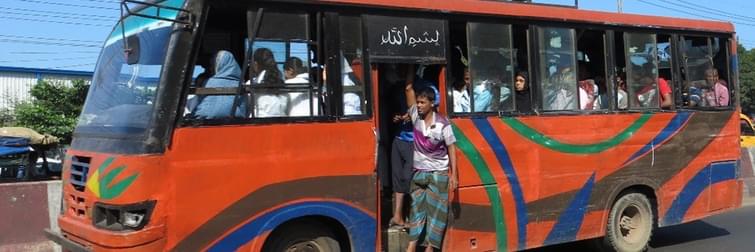
blog: Networks for a new world
Friday 20th November 2020
COVID-19 has impacted us all in ways we never expected – not least within transport systems in Low-Income Countries (LICs). Fewer people are using public transport to travel for work reducing the availability of services. This has had a disproportionately adverse impact on women as they, typically, carry the burden for trips to markets, health centres and to care for relatives or community members. Moreover, these trips become even more essential during times of crisis to keep communities functioning.
What’s the problem?
Urban transport networks have historically been designed around journeys to work in the formal sectors – traditionally considered the primary trip purpose. However, it has been well-documented that although this tends to serve the male population well, women’s journeys are more often for other purposes – for example unpaid care work (e.g. taking care of children or older relatives), to do household shopping or for health purposes.
Their journeys also tend to be more complex, taking in multiple destinations in one trip (‘trip-chaining’). They are more likely to travel while encumbered – for example with a buggy, young children or heavy shopping. Finally, women usually have less money than their male counterparts, and have less control of household income, which make them statistically more dependent on public transport in the developed world, or on informal transport or paratransit in the developing world.
COVID-19 has caused a reduction in formal public transport services, amongst many other impacts. This has created several shifts in the paradigm of travel, making it even harder for us to consider journeys to work the ‘primary’ trip purpose, and compounding existing inequalities. As such:
- Many workers are no longer making their single-leg trips to work, reducing the dominance of these trips in line with the reduction in service. Meanwhile women’s typically undervalued trips (accessing markets, health centres, unpaid caring roles etc.) continue, as they remain vital to the functioning of their communities.
- Due to the irreplaceable nature of these trips, the impact of reductions in transport services through 2020 will have disproportionately impacted women’s ability to support their families and communities.
- Looking forward past COVID-19, the need to enable and invest in local trips has particular relevance for women’s journeys.
What are we doing about it?
ITP have recently received a grant under the High Volume Transport Applied Research Programme (HVT), funded by the Foreign, Commonwealth & Development Office (FCDO) and managed by IMC Worldwide Ltd. Our project will seek to answer the question: ‘How can urban transport networks be rapidly reviewed, redesigned and rolled out for a more gender-equitable system?’
We intend to create a guidance document for cities to rapidly review their public transport networks, using a simple tool we have used all over the world – accessibility mapping. Accessibility mapping is traditionally used for network review – identifying gaps in existing networks and assessing the effectiveness of potential additions to the network. We plan to re-purpose the tool to be used for network design. Accessibility mapping helps us to understand all possible journeys, allowing us to prioritise current key journeys and creating a user needs-led methodology for network design. This has relevance for the COVID-19 crisis, but we hope, this will also have direct replicability for other post-crisis management environments where rapid, flexible action is key.
We’re planning to pilot this work in Myanmar, but the outcomes of this project will be able to benefit a huge range of different cities that are looking for support in re-planning their public transport networks in response to the impacts of COVID-19. We hope that with this work we will be able to help cities to create more gender-equitable transport networks and ensure to support all essential journeys in this difficult time.
For more information about this project as we develop it, contact Ian Stott (stott@itpworld.net)
